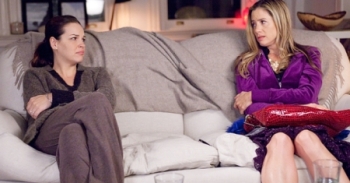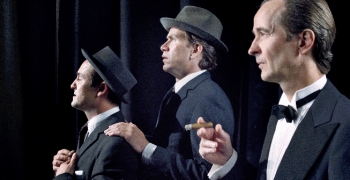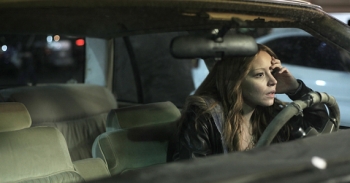

By Kim Voynar Voynar@moviecitynews.com
TIFF Dispatch #2: Catching Up
It’s been a very busy few days for me here at TIFF, as I’ve been aiming for four-five films a day this year and trying not to be hunched over a keyboard in the 15-20 minutes I have between screenings. So here’s a nice catch-up for you of some of the films I’ve been enjoying here at the fest.

Union Square
Family relationship dramas can be tricksy; when you’re writing a story that hinges on the intricacies of familial connections, you’re either treading on personal ground that’s fraught with subconscious feelings and angst and therefore have to fight the urge to not let too many rough edges show, lest any of your own friends and relations accuse you of building your story at their expense; or, you run the risk of trying to maintain such a distance from your own stories that you paint the strokes too broadly, creating a story and characters that feel contrived. Nancy Savoca achieves that delicate storytelling balance between complicated and complex with Union Square, a well-drawn, intimate tale about Jenny (Tammy Blanchard) and Lucy (Mira Sorvino), two sisters whose tumultuous childhood with a mentally unstable, suicidally depressed mother has evolved into two very messed up adulthoods.
Jenny is living a life of the sort one imagines she had envied as a child; it’s a life of polished wood floors, gleaming countertops, organic trail mix in the cabinets and organic vodka in the freezer. Jenny’s fiance Bill is a nice, neat, perfectly groomed, perfectly nice (albeit a little bland) sort of guy, the kind of guy who obsessively maintains his running stats on a chart.
It’s an orderly sort of life where the unexpected rarely happens — until the moment Lucy shows up without warning on her doorstep after a three year absence, blowing into Jenny’s carefully constructed facade of a life like a hurricane carrying with it debris from Jenny’s buried past.
Savoca, who co-wrote the script with Mary Tobler, gives her players some excellently crafted material to work with, and there’s some excellent acting in this film. It would be easy to give all the accolades to Sorvino’s showier performance, but Blanchard is terrific too, and they play off each other very well, conveying strength, fragility, and the pull-and-tug of sister relationships with nary a false note in their performances. The ending’s a bit overly contrived and sentimental, but that barely detracts from the film’s overall strength. This one’s worth catching.

A Funny Man
A Funny Man, from the team that made Applause, one of my favorite TIFF films from 2009, tells the story of Danish comedian Dirch Passer (Nikolaj Lie Kaas), one of Denmark’s most beloved and prolific comedic actors, his relationship with his stage partner, Kjeld Petersen (Lars Ranthe), and his desperation to be taken seriously as an actor, in spite of his profound success as a comedian. Both actors are terrific not only at bringing the comic routines of Dirch and Kjeld to life on the big screen, but also at conveying the love, friendship and professional jealousies between the legendary performers and, ultimately, the price Passer paid for his fame.
Director Martin Zandvliet does a great job of showing rather than telling this tale of a man who, like many performers, was plagued by insecurity and fear of failure. Zandvliet tackled similar themes around fame and tragedy in Applause, and he hits all the right emotional notes here as well, showing us the funny side of Dirch the comedian, and the insecurities, fears, and ultimate effects of his fame on Dirch the man. Both Kaas and Ranthe are excellent in their roles, giving deeply layered performances that reflect the famous comedian team both as they were viewed by their audience and as they viewed themselves.
On the technical front, the film is gorgeously shot on 35mm, which brings the feel of the 1950s and ’60s films in which Dirch Passer starred to life on the modern screen; the editing is sharp, fast-paced and compels the story forward for most of the film, but lingers more deliberately to make a point when that’s needed, particularly in scenes intended to convey the frantic pace of Dirch’s entertainer lifestyle; and production value is fantastic.
I tend to be a fan of a lot of the Danish filmmakers, but with Applause and now A Funny Man under his belt, Zandvliet is shaping up to be one of the more interesting filmmakers from that region. Even if you don’t consider yourself to be a connoisseur of Danish cinema, you’re likely to find something to like in A Funny Man.
Think of Me
Lauren Ambrose has a career-high turn in Think of Me, writer-director Brian Wizemann’s smart, suspenseful, intimate film about a single mother struggling to keep her head above water while raising her young daughter. Angela (Ambrose) works hard to support daughter Sunny (Audrey P. Scott), but with SUnny’s dad not in the picture and not paying child support, things are very hard. When Angela’s boss offers her a shady opportunity to get in on a real estate deal “guaranteed” to triple her investment, she jumps at the chance to get out from under.
But things, as they will, go awry with her investment plans, and her creepy co-worker Max (Dylan Baker) seems to be making some sort of move on Angela and Sunny. Next thing you know he’s offering to introduce them to his sister and her husband after giving Angela a sob story about how all his sister wanted was a adopt a child, and Angela, sinking deeper and deeper, finds herself torn by the terrible choice facing her.
I’m not sure if this was deliberate or not (I argued that it absolutely is, but my viewing partner for the film didn’t see it at all), but for me, the choice to cast Dylan Baker as Max created a great deal of dramatic tension for me in watching this film. The person with whom I watched the film saw Max as a nice, benevolent guy who just wanted to help both his sister and Angela’s daughter. Perhaps because I have some very strong feelings about Baker’s brave, compelling turn as a symapthetic pedophile in Todd Solondz’s 1998 film Happiness, the decision to cast him as Max created a layer of dramatic tension that completely drove the film for me. Is Max a benevolent, nice guy who just wants to help, or is the whole thing with his sister a carefully plotted ruse to get Sunny away from her mother? I still don’t know, but that not knowing, too, adds texture to the film for me.
You may have heard rumors that Lauren Ambrose has a good performance in this film; I would go so far as to say it’s both her best role and her strongest performance thus far, and it’s certainly the first that’s made me sit up and take notice and be very interested in seeing more of her. It’s worth noting also that the young actress playing her daughter is terrific, with a quality that reminds me a bit of very young Elle Fanning.
As for Wizemann, he’s written a story that’s both broadly empathetic to the plight of the many, many people struggling on the brink of financial disaster to hold their lives and their families together, to take care of their kids and give them the best shot they can, and socially relevant to the moment in which we’re living. In Angela, he’s created a complex character, a mother who loves her daughter deeply and wants very much to be a good mom taking good care of her daughter, but who also makes some pretty terrible choices along the way. Yet Wizemann, with his own choices as a writer-director, refrains from judging Angela and women like her, instead choosing to simply observe her struggles and see where she goes. Smart film, smart filmmaking.
Jeff, Who Lives at Home
On a lighter note, I was completely delighted by Jay and Mark Duplass’s latest effort, Jeff, Who Lives at Home. Now look, I know there are those of you who didn’t like their 2005 feature debut, The Puffy Chair. I don’t care. I liked it. I thought it was a smart low-budget debut that lacked great production value but showed me something more important: that these guys get on a very deep level what it means to be brothers, to have a sibling relationship that’s always there for you on some level in spite of whatever differences divide you.
With Jeff, Who Lives at Home, the brothers once again explore ideas around brotherly disdain and love and all the complicated feelings in between, with this very on point story about two very different brothers: Pat (Ed Helms), an uptight, upright guy whose marriage is falling apart at the seams, and Jeff (Jason Segal), who, well, lives at home in their mother’s basement.
Jeff superstitiously believes that all things happen for a reason. He’s obsessed with the movie Signs (boy, did that get a chuckle out of the P&I crowd), and a wrong number phone call looking for “Kevin” sets him off, turning an afternoon running an errand for his stressed out mother into a seeking of destiny that collides him with both Pat and his wife and several Kevins along the way. Interwoven with the story around the Pat and Jeff is the story of their mom Sharon, played with a touching, fragile sweetness by the reliably excellent Susan Sarandon.
Sharon’s not had a real date since her husband passed away a few years ago, and she’s feeling old and plump and frumpy and irritated with both her sons. She’s not sure when all that happened, when her once on-track life of happy marriage and happy motherhood devolved into this dullness, this mundane life of stress and working in a cubicle farm, but neither has she considered that she could change anything she wanted to about her life … until she starts getting messages from a secret admirer.
I really enjoyed this film, and it got a surprisingly positive response at the P&I screening (I was there, people, I heard you laughing and applauding, so no post-fest anti-Duplass backlashing, please). It does feel way more like a studio-produced film than anything the brothers have previously done (probably because it was produced by one), but you can still see their hand guiding things along, and there are a couple of really lovely emotional turns that really connected with me. If you’re already a fan of the Duplass brothers, I expect you’ll like this film quite a lot … and for those who aren’t, well, give it a shot anyhow. This one might just convert you.
















